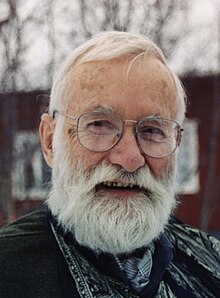Walter Jackson Freeman III
Walter Jackson Freeman III | |
|---|---|
 Photo of Walter J Freeman III circa 2007 | |
| Born | January 30, 1927 |
| Died | April 24, 2016 (aged 89) |
| Parent(s) | Walter Jackson Freeman II (father) William Williams Keen (great-grandfather) |
Walter Jackson Freeman III (January 30, 1927 – April 24, 2016), was an American biologist, theoretical neuroscientist[1] and philosopher who conducted research in rabbits' olfactory perception, using EEG. Based on a theoretical framework of neurodynamics that draws upon insights from chaos theory, he speculated that the currency of brains is primarily meaning, and only secondarily information.[2]
In "Societies of Brains" and in other writings, Freeman rejected the view that the brain uses representations to enable knowledge and behavior.
Biography and contribution to science
[edit]Walter Freeman was born in Washington, DC. His father was Walter Jackson Freeman II; his great-grandfather was William Williams Keen.
Freeman was a multi-disciplinary scientist, prominent in both neuroscience and mathematics. He studied physics and mathematics at the Massachusetts Institute of Technology, electronics in the Navy in World War II, philosophy at the University of Chicago, medicine at Yale University, internal medicine at Johns Hopkins, and neuropsychiatry at University of California, Los Angeles. He received his M.D. cum laude in 1954, the Bennett Award from the Society of Biological Psychiatry in 1964, a Guggenheim Fellowship in 1965, the MERIT Award from NIMH in 1990, and the Pioneer Award from the Neural Networks Council of the IEEE in 1992.[citation needed] He was a Professor Emeritus of Neurobiology at University of California, Berkeley. He was also the head of the international advisory council at the Bhaktivedanta Institute for advanced scientific research in consciousness.
Freeman was President of the International Neural Network Society in 1994, and is a Life Fellow of the IEEE. He has authored over 450 articles and 4 books.
In 2008, Freeman proposed that Thomism is the philosophical system explaining cognition that is most compatible with neurodynamics.[3]
Freeman died at his home in Berkeley, California on April 24, 2016 from pulmonary fibrosis, aged 89.[4]
A special Theme Issue of the journal Nonlinear Dynamics in Psychology (N 21/4, 2017) was devoted to Freeman's work and theory [5]
Bibliography
[edit]- Freeman, Walter. Mass Action in the Nervous System, 1975
- Freeman, Walter. Societies of Brains, 1995
- Freeman, Walter. How Brains Make up Their Minds, 1999
- Freeman, Walter. Neurodynamics, 2000
References
[edit]- ^ Bulkeley, Kelly (2005). Soul, psyche, brain: new directions in the study of religion and brain-mind science. Macmillan. pp. 163–. ISBN 9781403965097. Retrieved March 27, 2012.
- ^ Freeman, W.J. (2001). Chaotic Oscillaions and the Genesis of Meaning in Cerebral Cortex. In: W. Sulis and I. Trofimova. Nonlinear dynamics in the life and social sciences. Amsterdam, IOS Press. p. 44-62.
- ^ Freeman, Walter (2008). "Nonlinear Brain Dynamics and Intention According to Aquinas" (PDF). Mind & Matter. 62 (2). Exeter, UK: Imprint Academic: 207–234. ISSN 2051-3003. Retrieved April 13, 2013.
- ^ Robert Sanders (April 27, 2016). "Neurophysiologist and philosopher Walter Freeman dies at 89". Berkeley.edu. Retrieved May 3, 2016.
- ^ "Walter J. Freeman III". Nonlinear Dynamics in Psychology. 21/4. 2017.
External links
[edit]- W.J. Freeman Brain Dynamics Archived June 9, 2007, at the Wayback Machine
- 1927 births
- 2016 deaths
- Massachusetts Institute of Technology School of Science alumni
- American neuroscientists
- University of California, Berkeley faculty
- Yale School of Medicine alumni
- University of Chicago alumni
- University of California, Los Angeles alumni
- Johns Hopkins University alumni
- Deaths from pulmonary fibrosis
- People from Washington, D.C.
- Fellows of the IEEE
